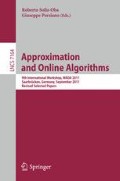Abstract
We investigate the problem of approximating the Pareto set of biobjective optimization problems with a given number of solutions. This task is relevant for two reasons: (i) Pareto sets are often computationally hard so approximation is a necessary tradeoff to allow polynomial time algorithms; (ii) limiting explicitly the size of the approximation allows the decision maker to control the expected accuracy of approximation and prevents him to be overwhelmed with too many alternatives. Our purpose is to exploit general properties that many well studied problems satisfy. We derive existence and constructive approximation results for the biobjective versions of Max Bisection, Max Partition, Max Set Splitting and Max Matching.
This research has been supported by the project ANR-09-BLAN-0361 GUaranteed Efficiency for PAReto optimal solutions Determination (GUEPARD).
Access this chapter
Tax calculation will be finalised at checkout
Purchases are for personal use only
Preview
Unable to display preview. Download preview PDF.
References
Alimonti, P.: Non-Oblivious Local Search for Graph and Hypergraph Coloring Problems. In: Nagl, M. (ed.) WG 1995. LNCS, vol. 1017, pp. 167–180. Springer, Heidelberg (1995)
Angel, E., Bampis, E., Gourvès, L.: Approximation algorithms for the bi-criteria weighted max-cut problem. Discrete Applied Mathematics 154(12), 1685–1692 (2006)
Angel, E., Bampis, E., Gourvès, L., Monnot, J.: (Non)-Approximability for the Multi-criteria TSP(1,2). In: Liśkiewicz, M., Reischuk, R. (eds.) FCT 2005. LNCS, vol. 3623, pp. 329–340. Springer, Heidelberg (2005)
Angel, E., Bampis, E., Kononov, A.: On the approximate tradeoff for bicriteria batching and parallel machine scheduling problems. Theoretical Computer Science 306(1-3), 319–338 (2003)
Bazgan, C., Hugot, H., Vanderpooten, D.: Implementing an efficient fptas for the 0-1 multi-objective knapsack problem. European Journal of Operational Research 198(1), 47–56 (2009)
Cormen, T.H., Leiserson, C.E., Rivest, R.L., Stein, C.: Introduction to Algorithms, 3rd edn. The MIT Press (2009)
Edmonds, J.: Paths, trees, and flowers. Canadian Journal of Mathematics 17, 449–467 (1965)
Ehrgott, M.: Multicriteria optimization. LNEMS. Springer, Heidelberg (2005)
Erlebach, T., Kellerer, H., Pferschy, U.: Approximating multiobjective knapsack problems. Management Science 48(12), 1603–1612 (2002)
Goemans, M.X., Williamson, D.P.: Improved approximation algorithms for maximum cut and satisfiability problems using semidefinite programming. Journal of ACM 42(6), 1115–1145 (1995)
Halperin, E., Zwick, U.: A unified framework for obtaining improved approximation algorithms for maximum graph bisection problems. Random Structure Algorithms 20(3), 382–402 (2002)
Hansen, P.: Bicriteria path problems. In: Fandel, G., Gal, T. (eds.) Multiple Criteria Decision Making: Theory and Applications, pp. 109–127 (1980)
Hastad, J.: Some optimal inapproximability results. Journal of ACM 48(4), 798–859 (2001)
Kann, V., Lagergren, J., Panconesi, A.: Approximability of maximum splitting of k-sets and some other apx-complete problems. Information Processing Letters 58(3), 105–110 (1996)
Karp, R.M.: Reducibility among combinatorial problems. In: Miller, R., Thatcher, J. (eds.) Complexity of Computer Computations, pp. 85–103. Plenum Press, New York (1972)
Manthey, B.: On Approximating Multi-Criteria TSP. In: Albers, S., Marion, J.-Y. (eds.) Proceedings of the 26th International Symposium on Theoretical Aspects of Computer Science (STACS 2009). LIPIcs, pp. 637–648 (2009)
Paluch, K., Mucha, M., Mądry, A.: A 7/9 - Approximation Algorithm for the Maximum Traveling Salesman Problem. In: Dinur, I., Jansen, K., Naor, J., Rolim, J. (eds.) APPROX 2009. LNCS, vol. 5687, pp. 298–311. Springer, Heidelberg (2009)
Papadimitriou, C.H., Yannakakis, M.: On the approximability of trade-offs and optimal access of web sources. In: Proceedings of the 41st Annual Symposium on Foundations of Computer Science (FOCS 2000), pp. 86–92 (2000)
Serafini, P.: Some considerations about computational complexity for multi objective combinatorial problems. In: Jahn, J., Krabs, W. (eds.) Recent Advances and Historical Development of Vector Optimization. Lecture Notes in Economics and Mathematical Systems, vol. 294, pp. 222–232 (1986)
Stein, C., Wein, J.: On the existence of schedules that are near-optimal for both makespan and total weighted completion time. Operational Research Letters 21(3), 115–122 (1997)
Tsaggouris, G., Zaroliagis, C.: Multiobjective Optimization: Improved FPTAS for Shortest Paths and Non-linear Objectives with Applications. In: Asano, T. (ed.) ISAAC 2006. LNCS, vol. 4288, pp. 389–398. Springer, Heidelberg (2006)
Warburton, A.: Approximation of pareto-optima in multiple-objective shortest path problems. Operations Research 35(1), 70–79 (1987)
Woeginger, G.: A polynomial time approximation scheme for maximizing the minimum machine completion time. Operations Research Letters 20(4), 149–154 (1997)
Zhang, J., Yea, Y., Han, Q.: Improved approximations for max set splitting and max NAE SAT. Discrete Applied Mathematics 142(1-3), 133–149 (2004)
Zwick, U.: Approximation algorithms for constraint satisfaction problems involving at most three variables per constraint. In: Proceedings of the 9th Annual ACM-SIAM Symposium on Discrete Algorithms (SODA 1998), pp. 201–210 (1998)
Author information
Authors and Affiliations
Editor information
Editors and Affiliations
Rights and permissions
Copyright information
© 2012 Springer-Verlag Berlin Heidelberg
About this paper
Cite this paper
Bazgan, C., Gourvès, L., Monnot, J. (2012). Approximation with a Fixed Number of Solutions of Some Biobjective Maximization Problems. In: Solis-Oba, R., Persiano, G. (eds) Approximation and Online Algorithms. WAOA 2011. Lecture Notes in Computer Science, vol 7164. Springer, Berlin, Heidelberg. https://doi.org/10.1007/978-3-642-29116-6_20
Download citation
DOI: https://doi.org/10.1007/978-3-642-29116-6_20
Publisher Name: Springer, Berlin, Heidelberg
Print ISBN: 978-3-642-29115-9
Online ISBN: 978-3-642-29116-6
eBook Packages: Computer ScienceComputer Science (R0)

